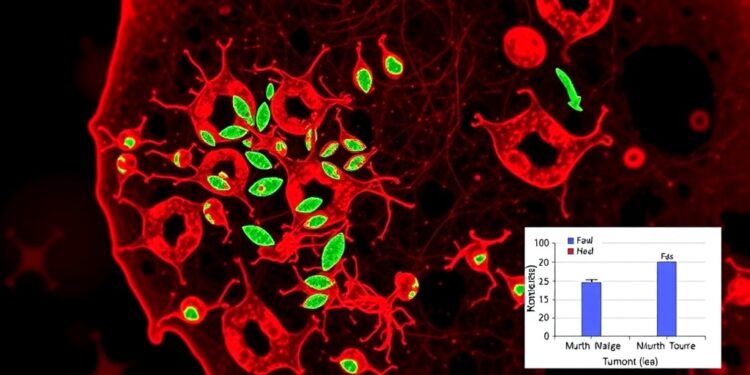A recent study conducted by researchers at Baylor College of Medicine reveals a significant understanding of the mechanisms through which certain tumors evade the body’s immune response, a crucial factor in cancer elimination. This research, published in the esteemed journal Science Advances, focuses on the roles of MAGE-4 protein and the tumor suppressor gene PTEN in the context of non-small cell lung cancer (NSCLC). The findings shed light on the complex interplay between tumor biology and the immune system, suggesting novel avenues for therapeutic intervention.
The researchers utilized a mouse model to investigate non-small cell lung cancer, paying particular attention to tumors expressing the MAGE-4 protein. Prior to this study, it was recognized that lung cancer patients with MAGE-4 expression often experience poor prognoses. However, the mechanisms driving this association remained poorly understood. Dr. Farrah Kheradmand, the study’s corresponding author, expressed the intrigue of delving into how MAGE-4 contributes to cancer development and progression.
Initial experiments involved creating a mouse model specifically expressing MAGE-4 in the airway. Unexpectedly, the anticipated tumor growth did not materialize, indicating that additional factors were necessary for cancer to develop. This realization prompted collaborative efforts with Dr. Chad Creighton, an expert in the analysis of extensive genetic datasets, including the Cancer Genome Atlas. Through examining the genetic profiles associated with MAGE-4, they discovered a commonality: the loss of the PTEN gene, a crucial tumor suppressor.
By developing a subsequent mouse model where MAGE-4 was present alongside the absence of PTEN, researchers observed rapid tumor development. This particular model exhibited aggressive characteristics, with tumors becoming metastatic within just a few months, surpassing rates seen in other cancer models. This critical finding positioned MAGE-4 not merely as a marker of disease severity but as an active participant in promoting tumor progression in conjunction with PTEN loss.
Explorations into tumor histology revealed a remarkable presence of plasma immune cells within the tumor microenvironment. These immune cells, absent from healthy lung tissues, raised questions about their functional roles in cancer biology. Collaborating with Dr. Linda Green, the team identified these infiltrating cells as plasma cells, specialized immune entities known for antibody production. Importantly, similar plasma cell accumulations were observed in human non-small cell lung cancer samples, underscoring the translational significance of the animal model findings.
Investigations revealed that these plasma cells produced immunosuppressive factors, including IgA antibodies, IL-10, and TGF-beta. These molecules collectively contribute to the suppression of potent immune responses typically mounted against tumors. Concurrently, there was an observed exclusion of cytotoxic T cells in the tumor microenvironment, limiting the immune system’s ability to target and eliminate the cancerous growth. Such findings emphasize the intricate balance between tumor cells and the immune cells within the microenvironment, suggesting that tumors can actively orchestrate their own survival by manipulating immune cell behavior.
Elimination of plasma cells in the experimental model led to significant increases in T cell infiltration and a marked reduction in tumor burden. This observation provides compelling evidence that plasma cells not only correlate with poor prognosis but actively contribute to immune evasion mechanisms in lung cancer. The researchers noted that these insights could pave the way for innovative treatment strategies aimed at disrupting the tumor-promoting effects of plasma cell accumulation.
The applications of this study extend beyond just enhancing understanding of tumor biology. With the recognition that MAGE-4 driven plasma cell accumulation impedes antitumor immunity, future therapeutic approaches could focus on strategies to selectively target and deplete these immune cells from the tumor microenvironment. Such interventions might restore the capacity of T cells to infiltrate and act upon the tumors, potentially leading to improved outcomes in patients with MAGE-4 expressing lung cancer.
Dr. Kheradmand emphasized the implications of their findings, suggesting that clinical trials could be designed to assess the feasibility of such plasma cell depleting strategies in human subjects. By leveraging knowledge from this study, researchers aspire to enhance antitumor immunity and optimize therapeutic efficacy in solid tumors, an area that has historically been challenging due to the immunosuppressive nature of the tumor microenvironment.
It is also noteworthy that the collaboration among various experts played a crucial role in the success of this research. The integration of genetic data analysis, advanced histological techniques, and immunological expertise highlights the multidisciplinary nature of scientific investigation, particularly in the field of cancer research. This study exemplifies how collaborative efforts can yield profound advancements in understanding disease mechanisms that can lead to actionable clinical strategies.
As researchers look forward, the path to translating these findings into effective therapies involves further exploration into the biological facets of tumor-microenvironment interactions. The emerging strategies targeting plasma cell dynamics represent just one aspect of a much larger puzzle in cancer treatment. Continued research is essential to unravel the complexities of these interactions and how they influence cancer immunity and patient outcomes.
In conclusion, this pivotal study not only deepens our understanding of non-small cell lung cancer and its immunological challenges but also sets the stage for innovative therapeutic approaches that may enhance treatment efficacy. As the interplay between immune evasion and tumor biology becomes clearer, the hope lies in developing effective strategies that can restore immune function in cancer patients and improve prognoses with targeted therapies.
Subject of Research:
Article Title:
News Publication Date:
Web References:
References:
Image Credits:
Keywords : Cancer, Tumor Immunology, Lung Cancer, MAGE-A4, PTEN, Immune Evasion, Plasma Cells, Tumor Microenvironment, Antitumor Immunity, Cancer Research.




